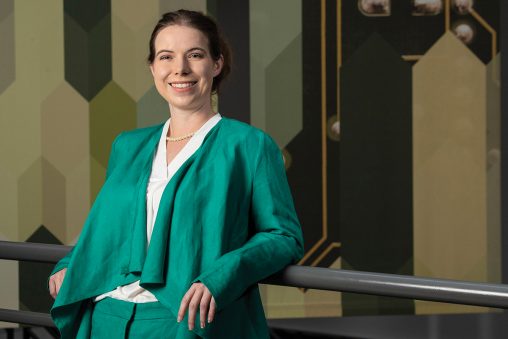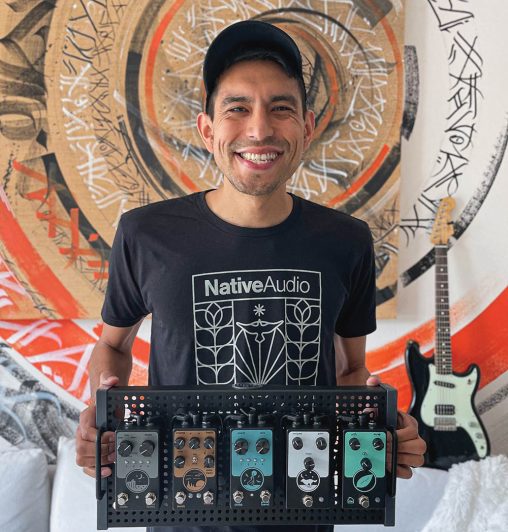Bevin Duckett ’14
STEM has a different meaning when applied to Bevin Duckett. Not Science, Technology, Engineering, and Math, but Space, Then Europa,
and Mars.
There are two other sets of uppercase letters that apply to Duckett: NASA (National Aeronautics and Space Administration) and JPL (Jet Propulsion Laboratory in Pasadena, Calif.). She works for the former and at the latter, part of NASA.
And while she’s not going to Europa, a moon of Jupiter, the fruits of her labor are: Mars? Been there, done that, going to do that again.
Duckett, who earned a bachelor’s degree in mechanical engineering with a minor in computer science from Wright State in 2014, is a flight software engineer for the Europa Clipper. Like clipper ships of old that sailed the seas, this clipper spacecraft will sail through space on a voyage that will take more than five years, arriving in 2030. The launch window opens in October 2024.
The software for the onboard computers is “the brains of the spacecraft,” she said from her home near Middletown, where she works remotely with the rest of her team, going to Pasadena on occasion. “It coordinates everything the spacecraft is going to do: It controls spacecraft navigation; monitors the power and thermal sensors to maintain spacecraft health and safety; turns the instruments on when the time comes to collect data; orchestrates saving the data to memory; and downlinks it to Earth when we are ready to retrieve it.
“We’re flinging this relatively small robot into space,” she says with a touch of awe in her voice. “We’ve been carefully working on it, designing it. It’s going to go far away from all of us and will have to succeed on its own, except for the operations team that will follow it from here.”
As the Europa Clipper sails to Jupiter, Duckett will be working on another project, likely one bound for a closer planet. She could be a software engineer on the Sample Return Lander spacecraft, which will sail to Mars, land, retrieve soil samples from a rover, and rocket the soil back to Earth. That mission is to launch later this decade.
As an undergraduate, Duckett interned at JPL, where she was on a team planning daily activities for the Mars Exploration Rover that was on the Red Planet. “There was the thrill of seeing images from an alien world that had been brought to Earth in a process I had been a part of,” she said. She was hired full time after she graduated.
Asked if this is her dream job, she said, “This wasn’t a job I even knew to dream about. It was unexpected, and I fell in love with it.”
As for the university’s role, “Wright State’s smaller class sizes and the dedication of the professors helped build a good foundation of education and problem-solving skills I apply every day in my job.”
Mike Trombley ’15, ’17
Often an engineer is more than an engineer. Take Mike Trombley, for instance. He’s also a musician. And a Native American who is proud of his heritage and culture.
Trombley combined all of those roles when he started a company that designed, built, and sold effects pedals for electric guitars. His love of music—he played guitar in the Troy area—got him connected with local performers. His bachelor’s and master’s degrees in electrical engineering—2015 and 2017, respectively—from Wright State helped provide the engineering know-how.
He started a company named Red House Electronics, but in 2018 rebranded it as NativeAudio to emphasize the connection with his roots.
Trombley was born and raised on the Blackfeet Reservation in Montana. He and his family left when he was in grade school and eventually settled in the Dayton area.
As he progressed through high school, he realized he was good at figuring out how things work. “I didn’t realize until later that that was an occupation,” Trombley said. “Weirdos like me become engineers.” He enrolled at Wright State because of its good reputation for engineering and its proximity.
As his business developed, he championed his heritage. “I didn’t necessarily see myself as an electronics company building stuff for the fun of it,” he said. “I was able to share my culture through sound.”
His most recent product is a new, larger effects pedal called War Pony, referring to Native American warriors’ horses, which, when going into battle, would be painted to reflect the history of their riders, Trombley said. The name also is a derivation of a war party, where members of a tribe would bond in a selfless attitude, he said.
Aside from his business, Trombley has taken a step in a slightly different direction. “I’m an engineer, so I like to learn, to exercise my brain,” he said.
He took on a freelance engineering project “which allows me to get outside the scope of music electronics and express myself in a different realm.”
One such project was to connect with the developer of a medical device that can detect whether a wire from a catheter remains in a patient. The developer “came up with the idea but couldn’t bring it to reality. I drew up the design that they’ll take to medical companies. It’s a really cool concept.”
Aside from his heritage, Trombley recognizes his academic background. “Wright State had an endless amount of resources for me to get a proper education while also applying a lot of practicality. Wright State engages engineers in practical experience.”
This article was originally published in the 2024 issue of the Wright State Magazine. Read more stories at wright.edu/magazine.
Class notes
Share your success with fellow alumni. Submit your class notes and updates at wrightstatealumni.com/classnotes.



 Walking through open doors
Walking through open doors  Adventures await
Adventures await  Wright State to expand nursing facilities to meet workforce needs and prepare more graduates for in-demand careers
Wright State to expand nursing facilities to meet workforce needs and prepare more graduates for in-demand careers  Wright State student-athletes make a lasting impact on local family with more to come
Wright State student-athletes make a lasting impact on local family with more to come  Wright State names Rajneesh Suri dean of Raj Soin College of Business
Wright State names Rajneesh Suri dean of Raj Soin College of Business 